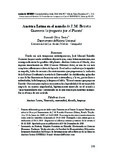Mostrar el registro sencillo del ítem
América Latina en el Mundo de J. M. Briceño Guerrero: la pregunta por el “puesto”
| dc.rights.license | http://creativecommons.org/licenses/by-nc-sa/3.0/ve/ | |
| dc.contributor.author | Bianculli, Teresa | |
| dc.date.accessioned | 2011-04-12T18:05:41Z | |
| dc.date.available | 2011-04-12T18:05:41Z | |
| dc.date.issued | 2010-12-31 | |
| dc.identifier.issn | 1856-9927 | |
| dc.identifier.uri | http://www.saber.ula.ve/handle/123456789/32821 | |
| dc.description.abstract | Desde sus más tempranas investigaciones, José Manuel Briceño Guerrero ha procurado establecer el puesto que, como latinoamericanos, nos corresponde entre los pueblos del planeta. América Latina en el Mundo, obra impresa inicialmente en 1966 (Caracas: Editorial Arte), es una de sus más completas reflexiones en favor de lograrlo. En el arduo combate que le significó su empeño, hubo de recurrir a los instrumentos que proporciona la tradición de la Cultura Occidental a través de la Universidad: los del filosofar, aplicados a una de las dimensiones humanas más universales y, a la vez, particulares e individuales, la del lenguaje, la lengua y el habla. Tal es el camino que propone Briceño Guerrero para explorar en nuestra alma la posibilidad de ser un pueblo aceptado en nuestra singularidad, legítimamente insertado en el mundo y —más trascendente aún— reconocido en lo que somos por nosotros mismos. Ese es el tema de este artículo. | es_VE |
| dc.language.iso | es | es_VE |
| dc.publisher | SABER ULA | es_VE |
| dc.rights | info:eu-repo/semantics/openAccess | |
| dc.subject | América Latina | es_VE |
| dc.subject | Venezuela | es_VE |
| dc.subject | Universidad | es_VE |
| dc.subject | Filosofía | es_VE |
| dc.subject | Lenguaje | es_VE |
| dc.title | América Latina en el Mundo de J. M. Briceño Guerrero: la pregunta por el “puesto” | es_VE |
| dc.title.alternative | América Latina en el Mundo by J. M. Briceño Guerrero: The question for the “position” | es_VE |
| dc.type | info:eu-repo/semantics/article | |
| dc.description.abstract1 | From his more early investigations, José Manuel Briceño Guerrero it has tried to establish since, as Latin Americans, it corresponds to us between the peoples of the planet. Latin America in the World, work printed initially in 1966 (Caracas: Edit. Arte), it is one of his more complete reflections in favor of achieving it. In the arduous combat that meant his determination, it had to resort to the instruments that there provides the tradition of the Western Culture across the University: them of philosophizes, applied to one of the most universal human and, dimensions simultaneously, individuals and individuals, that of the language, the language and the speech. Such it is the way that Briceño Guerrero proposes to explore in our soul the possibility of being a people accepted in our singularity, legitimately inserted in the world and —more transcendent still— recognized in what we are for us same. This it is the topic of this article. | es_VE |
| dc.description.colacion | 151-176 | es_VE |
| dc.description.email | tebianculli@yahoo.com; biancull@ula.ve | es_VE |
| dc.identifier.depositolegal | PP200908ME20 | |
| dc.publisher.pais | Venezuela | es_VE |
| dc.subject.dependencia | Grupo de Investigaciones sobre Historia de las Ideas en América Latina (GRHIAL) | es_VE |
| dc.subject.facultad | Facultad de Humanidades y Educación | es_VE |
| dc.subject.keywords | Latin America | es_VE |
| dc.subject.keywords | Venezuela | es_VE |
| dc.subject.keywords | University | es_VE |
| dc.subject.keywords | Philosophy | es_VE |
| dc.subject.keywords | Language | es_VE |
| dc.subject.seccion | Anuario GRHIAL: Artículo | es_VE |
| dc.subject.thematiccategory | Artes y Humanidades | es_VE |
| dc.subject.tipo | Revistas | es_VE |
| dc.type.media | Texto | es_VE |
Ficheros en el ítem
Este ítem aparece en la(s) siguiente(s) colección(ones)
-
Anuario GRHIAL Año 004 - Nº 004
Enero - Diciembre 2010


